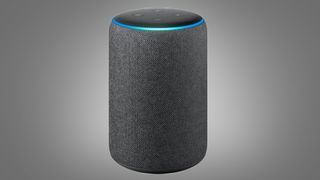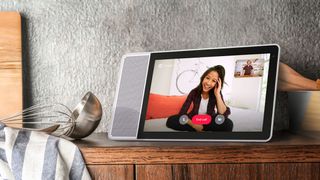Thought the lockdown would lead to a spike in smart speaker sales? Think again
Smart speakers are not selling like hotcakes

Since their inception, smart speakers have been touted as the new center of the home, providing us with music, supplying us with virtual PAs in the form of voice assistants, and acting as the control hub for the myriad smart home devices designed to make our lives easier.
However, smart speaker sales are slowing down – and that’s in spite of the lockdown conditions that many people across the world are facing, forcing more and more of us to spend much of our time at home.
- The best smart speakers of 2020
- The best smart home devices you can buy
- Amazon Echo vs Google Home: which is best?
You might have expected that all that time at home would lead to more people looking to improve their home audio setups, set up or expand smart home systems, and stay in touch with family using smart displays like the Google Nest Hub and the Amazon Echo Show.
That’s not what the numbers suggest, though: according to research firm Strategy Analytics (via Voicebot.ai), 28 million smart speakers were sold globally in Q1 of 2020, down from a peak of 55.8 million in the preceding months.
Usage is up, sales are way down
It’s not that people are using their existing smart speakers any less; on the contrary, a report by NPR and Edison found that 52% of people who have speakers equipped with voice assistants said they were using voice tech several times a day or nearly every day, compared to 46% before the Covid-19 outbreak.
Similarly, the survey found that “36% of adult smart speaker owners say they are using their device more to listen to music and entertainment”, while 35% of users are listening to more “news and information”.
David Watkins, director of Strategy Analytics agrees that lockdown conditions could strengthen the relationship we have with our smart speakers. Explaining the market research firm’s findings, he said that “much opportunity lies ahead of course, but the current stay-at-home conditions present an opportunity for smart speaker vendors and voice assistant operators to reinforce the value proposition of voice-first experience”.
Get daily insight, inspiration and deals in your inbox
Get the hottest deals available in your inbox plus news, reviews, opinion, analysis and more from the TechRadar team.
So, with smart speaker users clearly finding their devices more useful during the lockdown – we’ve all seen an increase in TV adverts extolling the virtues of making video calls with smart displays – why isn’t that translating to stronger sales?

A universal problem
Well, it’s a problem that’s affecting the wider tech industry, not just smart speaker manufacturers: people just aren’t buying devices in the numbers they were before the pandemic took hold and disrupted industries – and lives – the world over.
Smartphone sales have also plummeted, dropping from 99.2 million in February 2019 to just 61.8 million in February 2020, as Asian factories shut down and shoppers became hesitant to visit brick-and-mortar stores to make purchases.
Strategy Analytics’ executive director Neil Mawston, says this was “the biggest-ever fall in history of the worldwide smartphone market”, adding that it’s been a period that “the smartphone industry will want to forget”.
Smart speaker manufacturers will likely want to do the same. After all, they’ve seen their sales nearly cleaved in two in a matter of months – aside from production interruptions plaguing the industry, as with other products many of us are simply more cautious when it comes to making big purchases.
A silver lining?
It’s not all bad news, though. For some manufacturers, the lockdown has been an unexpected source of inspiration that could change the way smart speakers and voice assistants are designed in the future.
Mark Spates, Google’s product lead for smart speakers, has admitted that, in some ways, the lockdown has been advantageous for the tech giant.
“I think it’s enhanced the insight that we have on these devices, because now we’re spending 100% of our time with them,” he explained.
“I would actually say some of the new features you’re going to start seeing is because we’ve been living with our products every single day, finding new use cases for them and actually questioning some things.”.
So, as a direct result of the lockdown, we could see better, smarter, easier-to-use Google Nest speakers in the near future – and that could be a boon to smart speaker sales, just when the industry needs it the most.
Olivia was previously TechRadar's Senior Editor - Home Entertainment, covering everything from headphones to TVs. Based in London, she's a popular music graduate who worked in the music industry before finding her calling in journalism. She's previously been interviewed on BBC Radio 5 Live on the subject of multi-room audio, chaired panel discussions on diversity in music festival lineups, and her bylines include T3, Stereoboard, What to Watch, Top Ten Reviews, Creative Bloq, and Croco Magazine. Olivia now has a career in PR.

